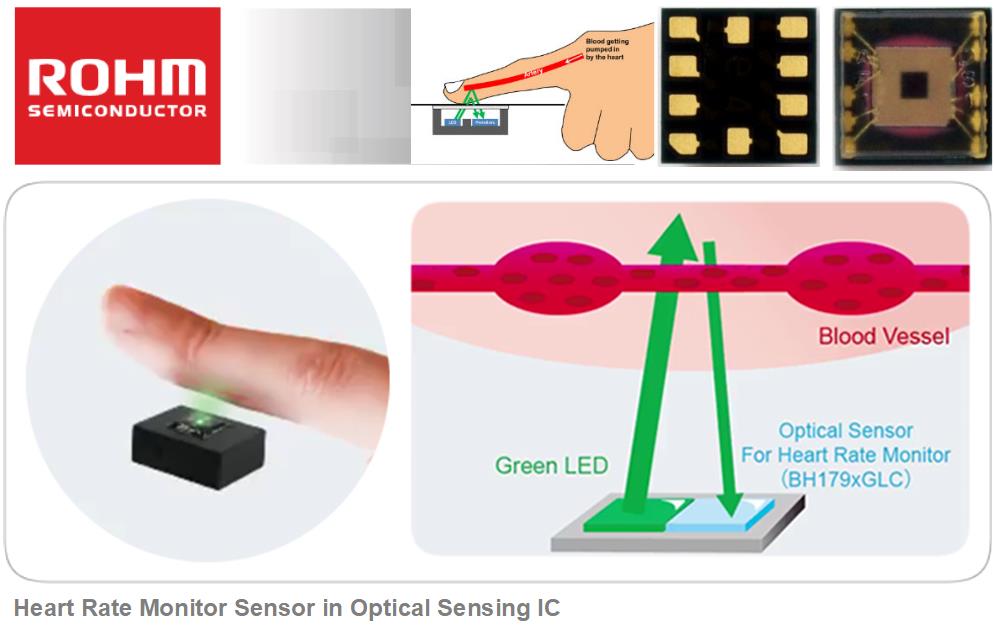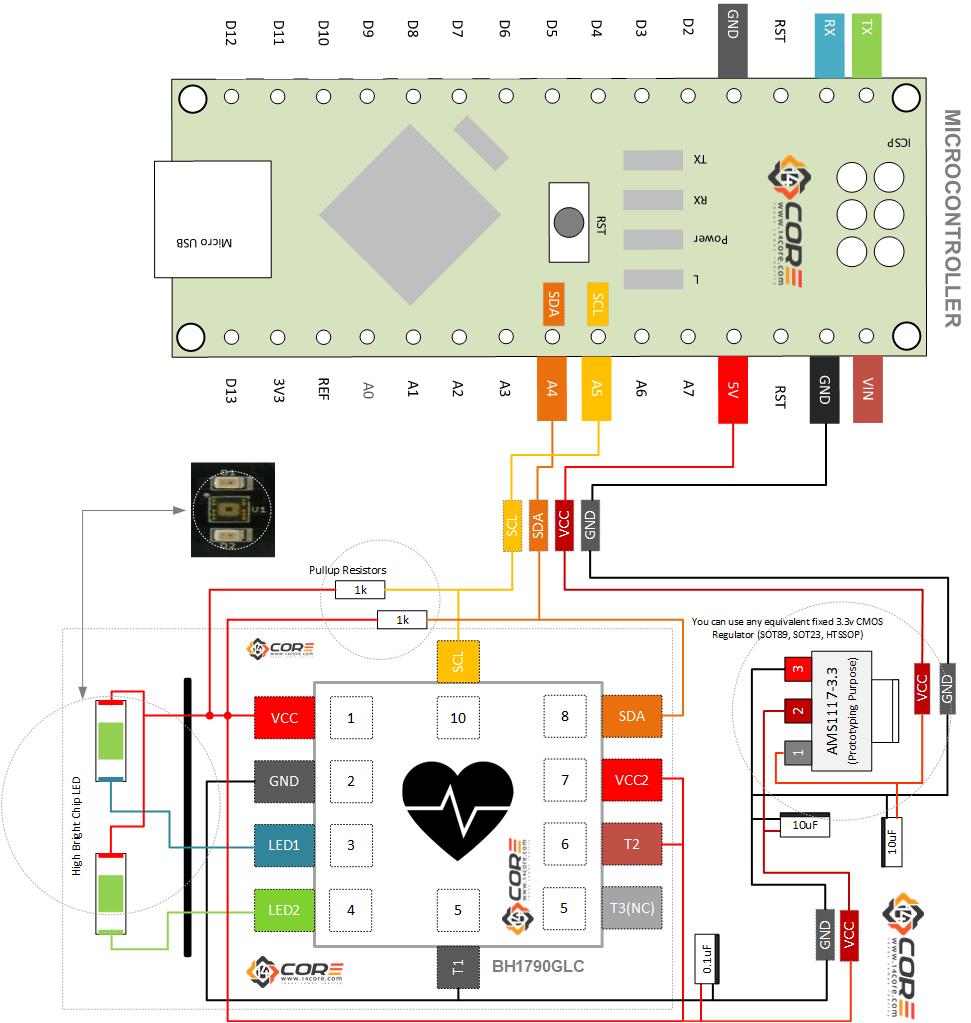#include <avr/sleep.h>
#include <Wire.h>
#include <FlexiTimer2.h>
extern "C" {
#include <bh1792.h>
}
bh1792_t senseBH1792;
bh1792_data_t senseBH1792_DATA;
void timer_isr(void);
void bh1792_isr(void);
int32_t i2c_write(uint8_t slv_adr, uint8_t reg_adr, uint8_t *reg, uint8_t reg_size);
int32_t i2c_read(uint8_t slv_adr, uint8_t reg_adr, uint8_t *reg, uint8_t reg_size);
void error_check(int32_t ret, String msg);
void setup() {
int32_t ret = 0;
set_sleep_mode(SLEEP_MODE_IDLE);
Serial.begin(115200);
Serial.println("14CORE | BH1790GLC Optical Heart Rate Monitor Sensor Test Code");
Serial.println("Initializing..................................................");
delay(4000);
while (!Serial);
Wire.begin();
Wire.setClock(400000L);
senseBH1792.fnWrite = i2c_write;
senseBH1792.fnRead = i2c_read;
ret = bh1792_Init(&m_bh1792);
error_check(ret, "bh1792_Init");
senseBH1792.prm.sel_adc = BH1792_PRM_SEL_ADC_GREEN;
senseBH1792.prm.msr = BH1792_PRM_MSR_SINGLE;//BH1792_PRM_MSR_1024HZ;
senseBH1792.prm.led_en = (BH1792_PRM_LED_EN1_0 << 1) | BH1792_PRM_LED_EN2_0;
senseBH1792.prm.led_cur1 = BH1792_PRM_LED_CUR1_MA(1);
senseBH1792.prm.led_cur2 = BH1792_PRM_LED_CUR2_MA(0);
senseBH1792.prm.ir_th = 0xFFFC;
senseBH1792.prm.int_sel = BH1792_PRM_INT_SEL_SGL;//BH1792_PRM_INT_SEL_WTM;
ret = bh1792_SetParams();
error_check(ret, "bh1792_SetParams");
Serial.println(F("GDATA(@LED_ON),GDATA(@LED_OFF)"));
ret = bh1792_StartMeasure();
error_check(ret, "bh1792_StartMeasure");
attachInterrupt(0, bh1792_isr, LOW);
FlexiTimer2::stop();
if (m_bh1792.prm.msr <= BH1792_PRM_MSR_1024HZ) {
FlexiTimer2::set(2000, 5.0/10000, timer_isr); // 1Hz timer
} else {
FlexiTimer2::set(250, 1.0/8000, timer_isr); // 32Hz timer
}
FlexiTimer2::start();
}
void loop() {
sleep_mode();
}
void timer_isr(void) {
int32_t ret = 0;
uint8_t tmp_eimsk;
tmp_eimsk = EIMSK;
EIMSK = 0;
interrupts();
if (m_bh1792.prm.msr <= BH1792_PRM_MSR_1024HZ) {
ret = bh1792_SetSync();
error_check(ret, "bh1792_SetSync");
if (m_bh1792.sync_seq < 3) {
if (m_bh1792.sync_seq == 1) {
tmp_eimsk = 0;
} else {
ret = bh1792_ClearFifoData();
error_check(ret, "bh1792_ClearFifoData");
tmp_eimsk = bit(INT0);
}
}
} else {
ret = bh1792_StartMeasure();
error_check(ret, "bh1792_StartMeasure");
}
noInterrupts();
EIMSK |= tmp_eimsk;
}
void bh1792_isr(void) {
int32_t ret = 0;
uint8_t i = 0;
EIMSK = 0;
interrupts();
ret = bh1792_GetMeasData(&senseBH1792_DATA);
error_check(ret, "bh1792_GetMeasData");
if(m_bh1792.prm.msr <= BH1792_PRM_MSR_1024HZ) {
for (i = 0; i < senseBH1792_DATA.fifo_lev; i++) {
Serial.print(senseBH1792_DATA.fifo[i].on, DEC);
Serial.print(F(","));
Serial.println(senseBH1792_DATA.fifo[i].off, DEC);
}
} else {
if(m_bh1792.prm.sel_adc == BH1792_PRM_SEL_ADC_GREEN) {
Serial.print(senseBH1792_DATA.green.on, DEC);
Serial.print(F(","));
Serial.println(senseBH1792_DATA.green.off, DEC);
} else {
Serial.print(senseBH1792_DATA.ir.on, DEC);
Serial.print(F(","));
Serial.println(senseBH1792_DATA.ir.off, DEC);
}
}
noInterrupts();
EIMSK = bit(INT0);
}
int32_t i2c_write(uint8_t slv_adr, uint8_t reg_adr, uint8_t *reg, uint8_t reg_size) //I2C should completed within 0.5ms see datasheet
{
byte rc;
if (m_bh1792.prm.msr <= BH1792_PRM_MSR_1024HZ) {
if((slv_adr != BH1792_SLAVE_ADDR) || (reg_adr != BH1792_ADDR_MEAS_SYNC)) {
while(FlexiTimer2::count == 1999);
}
}
Wire.beginTransmission(slv_adr);
Wire.write(reg_adr);
Wire.write(reg, reg_size);
rc = Wire.endTransmission(true);
return rc;
}
int32_t i2c_read(uint8_t slv_adr, uint8_t reg_adr, uint8_t *reg, uint8_t reg_size) //I2C should completed within 0.5ms see datasheet
{
byte rc;
uint8_t cnt;
if (m_bh1792.prm.msr <= BH1792_PRM_MSR_1024HZ) {
while(FlexiTimer2::count == 1999);
}
Wire.beginTransmission(slv_adr);
Wire.write(reg_adr);
rc = Wire.endTransmission(false);
if (rc == 0) {
Wire.requestFrom((int32_t)slv_adr, (int32_t)reg_size, true);
cnt = 0;
while(Wire.available()) {
reg[cnt] = Wire.read();
cnt++;
}
if(cnt < reg_size) {
rc = 4;
}
}
return rc;
}
void error_check(int32_t ret, String msg) //ERROR HANDLER
{
if(ret < 0) {
msg = "Error: " + msg;
msg += " function";
Serial.println(msg);
Serial.print("ret = ");
Serial.println(ret, DEC);
if(ret == BH1792_I2C_ERR) {
Serial.print("i2c_ret = ");
Serial.println(m_bh1792.i2c_err, DEC);
}
while(1);
}
}







While using Nodemcu – flexitimer2.h i get a error as
\arduino-1.8.5\libraries\FlexiTimer2/FlexiTimer2.h:7:2: error: #error FlexiTimer2 library only works on AVR architecture
#error FlexiTimer2 library only works on AVR architecture
Do u have any alternative for this?
Have you try to use timer2/mstimer2 instead of using flexitimer2?
https://playground.arduino.cc/Main/MsTimer2
When I using Wemos D1- flexitimer2 and mstimer2 is not working!!
“” library only works on AVR architecture””
And i found esp8266 is use “SimpleTimer.h”, but i don’t know to change HeartRate.ino code!
please help me!!!!!
Hi! try this code library.
https://www.14core.com/wp-content/uploads/2019/05/BH1790GLC_HeartRate_Library.zip
Sorry, the BH1790GLC_HeartRate code is still not working in “Wemos D1”.
They still display “” library only works on AVR architecture”” and “#error FlexiTimer2 library only works on AVR architecture”.
Please, Thanks!
i have this error when compiling:
m_bh1792′ was not declared in this scope.
Can advice? Am i missing some libraries?
change it to senseBH1792, note m_bh1792 is a variable declared in the i2c library just to senseBH1792.
Hi ineed help as well , when i charge the program i dont get values , iget like this “§§§§ùùùù????????????????????????????????????????????”
idont undersand why
Check or log to serial mon, check if you get the correct value? or change the encoding.